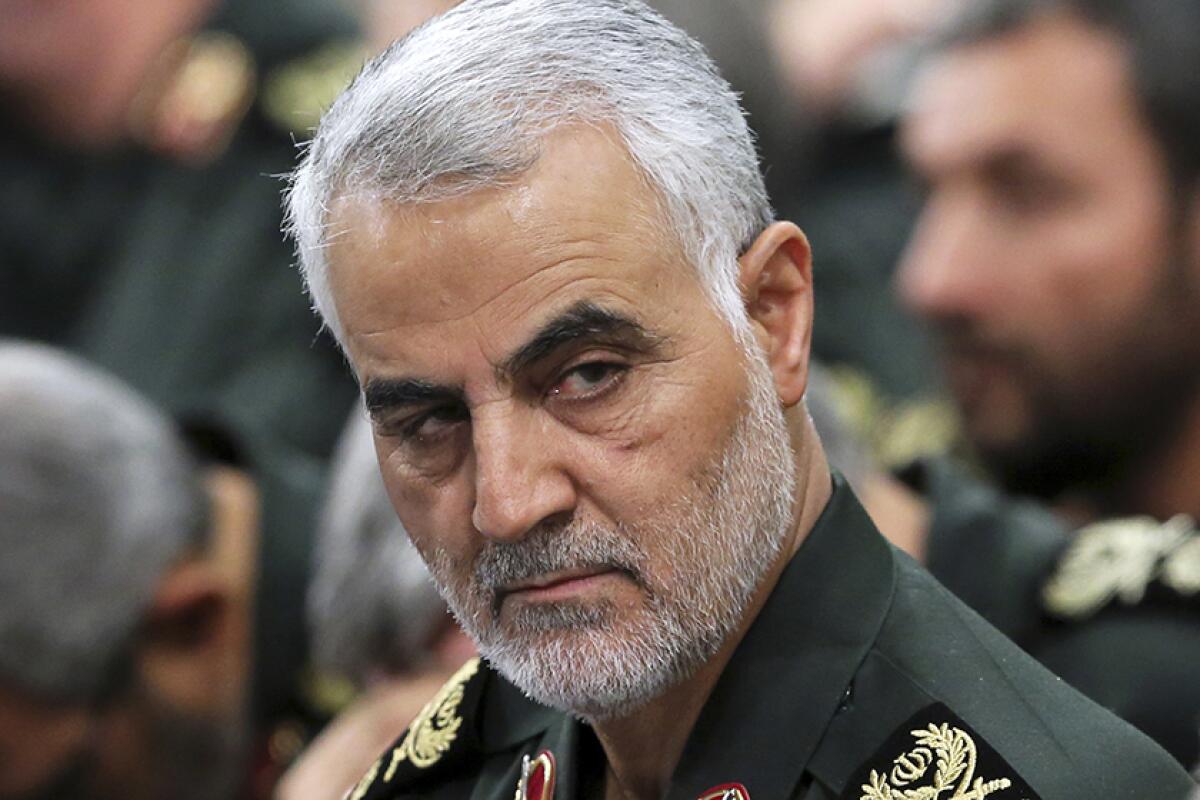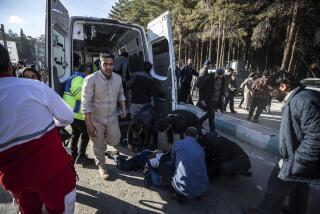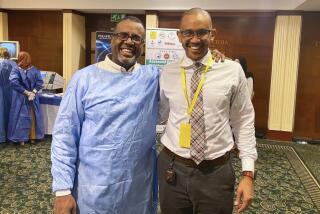Opinion: Suleimani is owed no eulogies, but his record is more complicated than ‘evil mastermind’

- Share via
The American military won’t miss Major Gen. Qassim Suleimani. As the mastermind of Iran’s foreign military operations, Suleimani, who died Friday in a U.S. airstrike, was responsible for the deaths of hundreds of U.S. soldiers over a decade and a half in Iraq.
Yet, though he is owed no eulogies, Suleimani leaves a more complicated record than it might at first seem. Over the years, he proved himself again and again willing to negotiate with his American adversaries. And sometimes he was willing to make compromises that helped U.S. officials reach their goals. He was the kind of figure, not uncommon in statecraft, who diplomats find they need to do business with, despite their qualms.
The commander of the elite Quds Force of the Islamic Revolutionary Guard Corps, Suleimani was a looming though invisible presence in many of the conflicts U.S. forces have engaged in since 9/11, including those in Afghanistan, Iraq and Syria. And during that time, he dealt repeatedly with one U.S. diplomat, the Mideast specialist Ambassador Ryan C. Crocker, though the two never met face to face.
Not long after Al Qaeda’s 9/11 attacks, U.S. forces and their Afghan allies toppled the Taliban government that had provided a haven for Al Qaeda. Then came the job of working together with other world powers to set up a new government in Kabul. The Iranians, who had long been at odds with their eastern neighbor, opened secret talks with U.S. officials to discuss how to beat the Taliban and also how to put together a successor regime.
Crocker was the point man for those talks, held in Geneva, Paris and New York starting in late September 2001. The Iranian team included three officials, one of whom was a Quds Force member.
Crocker, who left government service in 2012, later said in an interview that the Iranian negotiators were receiving their marching orders directly from Suleimani back in Tehran.
Months later, after Crocker was dispatched to Kabul to run the newly reopened U.S. embassy, talks with the Iranians picked back up. Troops of the Islamic Revolutionary Guard Corps were all over the country, but they never fought with CIA operators or U.S. special forces, because of a tacit agreement made with Suleimani’s blessing.
Publicly, the Tehran government continued to denounce the U.S. government, as it always had since the 1979 revolution. But privately, Crocker was getting word from Iranian officials that Suleimani was very pleased with the two countries’ collaboration, which included building a network of roads in Afghanistan.
The harmony was short-lived. On Jan. 29, 2002, President Bush denounced Iran as part of an “axis of evil,” and threatened to attack its nuclear program. At their next meeting, the Iranians made clear they felt betrayed. One of the diplomats told Crocker that Suleimani was especially enraged. He had been advocating in Tehran for a continuation of the U.S.-Iranian talks, and now felt politically vulnerable.
Crocker had seen repeated signs that Suleimani was coming to the view that Iran should end its long antagonism with the United States for a better relationship. Now that hope was lost. “One word in one speech changed history,” Crocker said later.
Even after his change of heart, however, Suleimani continued to engage. In 2003, after the U.S. invasion of Iraq, Crocker was dispatched to Baghdad to help organize an Iraqi advisory council that was going to try to take the first steps toward a democratic government.
Crocker understood that the Iranians were extremely influential in Iraq, and thought the council wouldn’t work without some level of their support. Getting that support meant indirect communication with Suleimani about who should be picked for the council.
Crocker would tell the Iraqi Shia leader Adel Abdul Mahdi, who is now Iraq’s prime minister, which Iraqis he was considering for the council. Abdul Mahdi would run the names past Suleimani, and Crocker would drop candidates Suleimani objected to. The formation of the governing council had become, in part, a negotiation between Tehran and Washington, Crocker said.
Crocker became involved in another indirect negotiation with Suleimani in 2007 when he served as ambassador to Iraq. By then, the struggle in Iraq between the United States and Iran had become bitter and bloody. Suleimani’s forces were training and equipping Iraqi Shia militia to attack U.S. troops and were inflicting an ever-higher death toll. Talks with Iraq on the issue went nowhere, however, and Americans continued to die because of Suleimani’s directives.
On Friday, Crocker told me he wasn’t sorry Suleimani had been killed, though he is worried about where an escalating conflict could lead. And Crocker still gives Suleimani credit for recognizing the wisdom of talking to a foe. The general, Crocker said, “understood that countries have overlapping interests, even when they’re bitter adversaries.”
Paul Richter is a former Los Angeles Times diplomatic correspondent and author of “The Ambassadors: America’s Diplomats on the Front Lines.”
More to Read
A cure for the common opinion
Get thought-provoking perspectives with our weekly newsletter.
You may occasionally receive promotional content from the Los Angeles Times.










